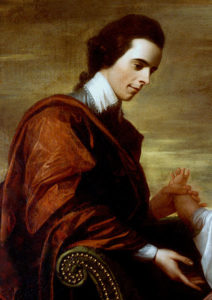Arthur Middleton was a South Carolinian delegate to the Continental Congress, a United States patriot, and a signer of the Declaration of Independence.

Arthur Middleton was a South Carolinian delegate to the Continental Congress, a United States patriot, and a signer of the Declaration of Independence.
Arthur Middleton was born on June 26, 1742 to Henry Middleton and Mary Baker Williams, both of strong English background. As a boy he was schooled in Britain at Harrow. After, he studied at Westminster. After graduation, he continued his studies at Trinity Hall, Cambridge. Later, he went on to study law at Middle Temple. Finding that he had a passion for learning, Arthur desired to study literature, music, and arts. Upon finishing law school, he went and studied abroad throughout Europe.
On August 19, 1764 Arthur took a break from his studies and married Mary Izard. The happy couple settled down in South Carolina in late 1764. Upon arriving in South Carolina, Arthur Middleton became interested in politics. His father, Henry (a member of the First Continental Congress) was never as radical as his son Arthur. As they entered into the most popular topic of the 18th century, this difference caused a lot of strife in their relationship.
Arthur became a leading member of the American Party in Carolina and an outspoken Council of Safety member. In 1776, Congress was trying to ensure that all the colonies voted in favor of independence. The vote would already be majority, but to present a united front, the vote would need to be unanimous. As such, some of the delegates were being replaced with ones that were less conservative. During this time, Arthur Middleton was asked to replace his father in the Second Continental Congress and he signed the Declaration of Independence. Later that year, Arthur Middleton and William Henry Drayton also designed the Great Seal of South Carolina.
During the War, Arthur served at Charleston. In 1780, however, Arthur Middleton was taken hostage along with Edward Rutledge, fellow signer of the Declaration, during the fall of Charleston. The two were imprisoned until the Americans were able to make a trade for them the next year. They were released in July of 1781.
Arthur Middleton died on January 1, 1787 in his home in South Carolina. He was buried there, where he still rests today.


